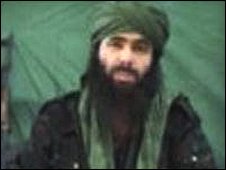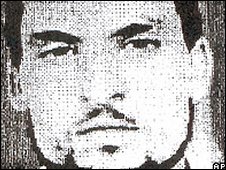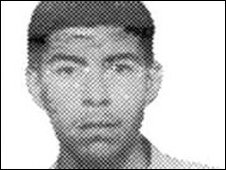Ab-Titchaz
JF-Expert Member
- Jan 30, 2008
- 14,631
- 4,225
France declares war against al-Qaida


A photo released Monday July 26, 2010 by the City of Marcoussis, south of Paris, showing French aid group Enimilal member, Michel Germaneau, in 2007.
By ELAINE GANLEY, Associated Press Writer – 18 mins ago
PARIS – France has declared war on al-Qaida, and matched its fighting words with a first attack on a base camp of the terror network's North African branch, after the terror network killed a French aid worker it took hostage in April.
The declaration and attack marked a shift in strategy for France, usually discrete about its behind-the-scenes battle against terrorism.
"We are at war with al-Qaida," Prime Minister Francois Fillon said Tuesday, a day after President Nicolas Sarkozy announced the death of 78-year-old hostage Michel Germaneau.
The humanitarian worker had been abducted April 20 or 22 in Niger by al-Qaida in the Islamic Maghreb, and was later taken to Mali, officials said.
The killers will "not go unpunished," Sarkozy said in unusually strong language, given France's habit of employing quiet cooperation with its regional allies Mauritania, Mali, Niger and Algeria - in which the al-Qaida franchise was spawned amid an Islamist insurgency.
The Salafist Group for Call and Combat formally merged with al-Qaida in 2006 and spread through the Sahel region - parts of Mauritania, Mali and Niger.
Officials suggest France will activate accords with these countries to stop the terrorists in their tracks.
"It's a universal threat that concerns the entire world ... not just France or the West," Defense Minister Herve Morin said Tuesday on France-2 television. "We will support local authorities so these assassins and (their) commanders are tracked, judged and taken before justice and punished. And, yes, we will help them."
Algeria, Mauritania, Mali and Niger in April opened a Military headquaters deep in the desert to respond to threats from traffickers and the al-Qaida offshoot. U.S. Special Forces have helped the four nations train troops in recent years.
The United States said it would help the French "in any way that we can" to bring those who killed Germaneau to justice, according to U.S. State Dept. spokesman P.J. Crowley.
"There is no religion that sanctions what can only be described as cold-blooded murder," Crowley said Tuesday.
Fillon refused to say how France would act. "But we will," he said in an interview with Europe 1 radio.
And perhaps it already has. On Thursday, the French backed Mauritanian forces in attacking an al-Qaida camp on the border with Mali, killing at least six suspected terrorists. It is the first time France is known to have attacked an al-Qaida base.
France said it was a last-ditch effort to save its citizen, while Mauritania said it was trying to stop an imminent attack by fighters gathering at the base.
For the French, the move may have backfired. The al-Qaida group said in an audio message broadcast Sunday that it had killed Germaneau in retaliation for the raid. However, French officials suggested, however, that the hostage, who had a heart problem, may already have been dead. Even now, "We have no proof of life or death," Morin said.
"We can expect an increase in the French riposte," said Antoine Sfeir, an expert on Islamist terrorists who has traveled in the region.
An estimated 400-500 such fighters are thought to roam the Sahel region, a desert expanse as large as the European Union.
Despite meager numbers, the region's al-Qaida fighters pose a clear threat. Among the more recent victims, a British captive was beheaded last year and two Spanish aid workers were taken hostage in Mauritania in November. Spain is working to free them. Mauritanian soldiers also have fallen in numerous attacks.
The head of the French Institute of Strategic Analysis suggested the French government's rhetoric was normal.
"It's important to make that kind of announcement," Francois Gere said. "I think it's made of the same stuff" as former U.S. President George W. Bush's tough line on al-Qaida.
But "a government has to make clear it must respond strongly" while maintaining the discretion needed to ensure cooperation, Gere said. In the past France has been cautious because those governments don't want the appearance of interference from the West, he said.
Spain has maintained a low profile as videos by the al-Qaida franchise regularly call for the conquest of "al-Andalus" - a reference to the period of Muslim rule of much of Spain in medieval times.
France declares war against al-Qaida - Yahoo! News


A photo released Monday July 26, 2010 by the City of Marcoussis, south of Paris, showing French aid group Enimilal member, Michel Germaneau, in 2007.
By ELAINE GANLEY, Associated Press Writer – 18 mins ago
PARIS – France has declared war on al-Qaida, and matched its fighting words with a first attack on a base camp of the terror network's North African branch, after the terror network killed a French aid worker it took hostage in April.
The declaration and attack marked a shift in strategy for France, usually discrete about its behind-the-scenes battle against terrorism.
"We are at war with al-Qaida," Prime Minister Francois Fillon said Tuesday, a day after President Nicolas Sarkozy announced the death of 78-year-old hostage Michel Germaneau.
The humanitarian worker had been abducted April 20 or 22 in Niger by al-Qaida in the Islamic Maghreb, and was later taken to Mali, officials said.
The killers will "not go unpunished," Sarkozy said in unusually strong language, given France's habit of employing quiet cooperation with its regional allies Mauritania, Mali, Niger and Algeria - in which the al-Qaida franchise was spawned amid an Islamist insurgency.
The Salafist Group for Call and Combat formally merged with al-Qaida in 2006 and spread through the Sahel region - parts of Mauritania, Mali and Niger.
Officials suggest France will activate accords with these countries to stop the terrorists in their tracks.
"It's a universal threat that concerns the entire world ... not just France or the West," Defense Minister Herve Morin said Tuesday on France-2 television. "We will support local authorities so these assassins and (their) commanders are tracked, judged and taken before justice and punished. And, yes, we will help them."
Algeria, Mauritania, Mali and Niger in April opened a Military headquaters deep in the desert to respond to threats from traffickers and the al-Qaida offshoot. U.S. Special Forces have helped the four nations train troops in recent years.
The United States said it would help the French "in any way that we can" to bring those who killed Germaneau to justice, according to U.S. State Dept. spokesman P.J. Crowley.
"There is no religion that sanctions what can only be described as cold-blooded murder," Crowley said Tuesday.
Fillon refused to say how France would act. "But we will," he said in an interview with Europe 1 radio.
And perhaps it already has. On Thursday, the French backed Mauritanian forces in attacking an al-Qaida camp on the border with Mali, killing at least six suspected terrorists. It is the first time France is known to have attacked an al-Qaida base.
France said it was a last-ditch effort to save its citizen, while Mauritania said it was trying to stop an imminent attack by fighters gathering at the base.
For the French, the move may have backfired. The al-Qaida group said in an audio message broadcast Sunday that it had killed Germaneau in retaliation for the raid. However, French officials suggested, however, that the hostage, who had a heart problem, may already have been dead. Even now, "We have no proof of life or death," Morin said.
"We can expect an increase in the French riposte," said Antoine Sfeir, an expert on Islamist terrorists who has traveled in the region.
An estimated 400-500 such fighters are thought to roam the Sahel region, a desert expanse as large as the European Union.
Despite meager numbers, the region's al-Qaida fighters pose a clear threat. Among the more recent victims, a British captive was beheaded last year and two Spanish aid workers were taken hostage in Mauritania in November. Spain is working to free them. Mauritanian soldiers also have fallen in numerous attacks.
The head of the French Institute of Strategic Analysis suggested the French government's rhetoric was normal.
"It's important to make that kind of announcement," Francois Gere said. "I think it's made of the same stuff" as former U.S. President George W. Bush's tough line on al-Qaida.
But "a government has to make clear it must respond strongly" while maintaining the discretion needed to ensure cooperation, Gere said. In the past France has been cautious because those governments don't want the appearance of interference from the West, he said.
Spain has maintained a low profile as videos by the al-Qaida franchise regularly call for the conquest of "al-Andalus" - a reference to the period of Muslim rule of much of Spain in medieval times.
France declares war against al-Qaida - Yahoo! News


